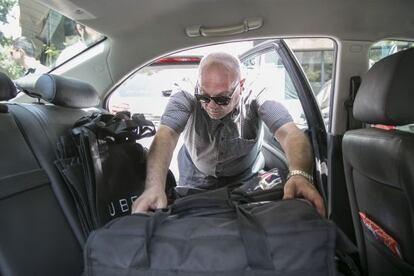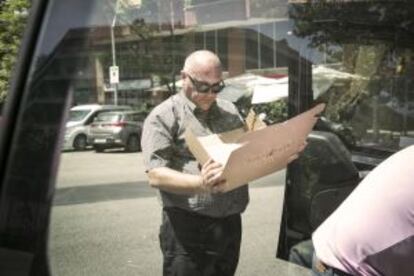Despite court ban in Spain, Uber drivers return to streets of Barcelona
The car-sharing service has transformed itself into an upmarket food delivery firm

It’s lunchtime. The GPS in Francesc Manchón’s Chevrolet beeps, and he sets off to the Carrer de Balmes, a main avenue running through central Barcelona. On the back seat are three thermal bags connected to the car’s cigarette lighter to keep their contents – six stir-fries, six salmon burgers and three other dishes – hot. For the next couple of hours, Manchón will be delivering lunches throughout the city. The former security guard drives for Uber, the taxi and ride-sharing application whose transport activities were shut down at the end of last year by a Spanish court. Undeterred, Uber, valued at $50 billion, has launched a new Spanish service called Uber Eats, which customers can use to order take-out food via its cellphone app for delivery in Barcelona.
The company refuses to say how many drivers it has on its books in Barcelona – in London there are around 15,000 – but its Uber Eats service in the Catalan capital only delivers on behalf of two restaurants at a time, with customers able to choose from just two dishes, along with the eatery’s lunchtime set menu.
I didn’t understand the Uber ban. All we hear about is the need to share our cars, but then they go and rule against it” Uber Eats driver Francesc Manchón
Uber’s drivers come in all shapes and sizes: many of them are immigrants, while others, like Manchón, are people reinventing themselves as the economy changes and provides new opportunities. Some, such as Eric, a Spaniard, and Gilbar, a Brazilian, make their living driving for Uber. Others, such as Xavi, aged 16, only work for the company part time to boost their earnings. Xavi delivers in the Raval area of the city aboard a bicycle he has adapted. He says he came up with a business plan to deliver food by bike and presented it to Uber, which invited him to join its team of drivers. “The money comes in handy. I think this is a good idea,” he says one night at 10pm, during the middle of his shift.
Francesc Manchón, who makes a point of being very polite to his customers and keeps his car spotless, is perhaps the antithesis of the traditional pizza delivery guy. The 49-year-old widower lives in a 50-square-meter apartment with his Yorkshire terrier in the city’s working-class Verneda neighborhood. He moved here two years ago after his wife died of cancer and he was made redundant from the security firm he worked for. He needed to reduce his outgoings and get out more, he says. Driving people around and earning a little extra seemed like a reasonable way of overcoming his situation.

But then the problems began: some Uber drivers were attacked or had their cars damaged by taxi drivers who saw them as unfair competition. Manchón says that on one occasion he was even caught in an ambush. But he refused to get out of his vehicle. “They called us up, and then canceled when we arrived; the idea was to surround us. I didn’t understand the ban. All we hear about is the need to share our cars, but then they go and rule against it,” he says as he drives to his next delivery.
Francesc earns around €170 a week. He is paid €2.50 for each delivery, from which Uber takes a 20-percent commission. He also needs to be registered as self-employed (which costs around €260 a month in social security contributions), and pay his own gasoline. “It’s not much, but it pays the rent,” he says. He works two shifts a day: lunch, between 12.30pm and 3.30pm, and dinner, between 8.30pm and 11.30pm. At the beginning of each shift, Uber drivers load up their deliveries from different pick-up points in the city where vans filled with thermal bags are waiting for them. The drivers have no contract with the restaurants and the trick to getting the food to the customer in as little as three minutes consists of driving around the city constantly so that the GPS can identify the nearest vehicle to the delivery point.
The establishments that work with Uber – they change each day and all are upmarket – aren’t making much money out of this, says the manager of one, who prefers to remain anonymous: “But it’s a good marketing tool.” Depending on the size of the sale, Uber takes a share of the restaurant’s profit that can be as much as 30 percent if everything is sold, or zero if less than 60 percent of what has been prepared that day is sold.
For the moment, Uber Eats has not run into any legal problems. A company spokesman says the new service reflects Uber’s philosophy: “After transporting passengers we realized that there was a demand for quality food delivery. Putting people in offices or at home in contact with their favorite restaurant was a good idea. Our goal is to be ubiquitous. Now the average waiting time has been reduced to under eight minutes.” Francesc is never later than this. Sometimes people don’t even have time to put their shoes on to come down to open the door. “The whole thing is very speedy,” he says. “Even when people change their mind about an order.”
Chronology of a ban
- Uber is born. At the end of February 2013, Uber starts operating its Uber Pop taxi service, challenging a transport model that has been in place for many decades in up to 80 countries. On April 15, 2014, Belgium becomes the first nation to ban the service.
- June 9, 2014. The app is valued at €13.3 billion, one of the highest for a Silicon Valley company. Spanish taxi drivers mobilize against what they say is unfair competition.
- June 11, 2014. Taxi strikes against Uber in Madrid and Barcelona result in two injuries.
- August 14, 2014. Berlin bans Uber.
- Spain joins the ban. On December 31, 2014, Uber says it is suspending its taxi service in Spain. In March of 2015, it sets up Uber Eats in Barcelona.
- France joins the ban. On July 3, following an altercation with French taxi drivers, the company suspends activities while awaiting a court ruling.
- Mexico. Three months after fights with taxi drivers, the government offers the company the chance to regulate its services in return for accepting certain conditions. If it accepts, the country would become the first to regulate the company's activities.
Tu suscripción se está usando en otro dispositivo
¿Quieres añadir otro usuario a tu suscripción?
Si continúas leyendo en este dispositivo, no se podrá leer en el otro.
FlechaTu suscripción se está usando en otro dispositivo y solo puedes acceder a EL PAÍS desde un dispositivo a la vez.
Si quieres compartir tu cuenta, cambia tu suscripción a la modalidad Premium, así podrás añadir otro usuario. Cada uno accederá con su propia cuenta de email, lo que os permitirá personalizar vuestra experiencia en EL PAÍS.
¿Tienes una suscripción de empresa? Accede aquí para contratar más cuentas.
En el caso de no saber quién está usando tu cuenta, te recomendamos cambiar tu contraseña aquí.
Si decides continuar compartiendo tu cuenta, este mensaje se mostrará en tu dispositivo y en el de la otra persona que está usando tu cuenta de forma indefinida, afectando a tu experiencia de lectura. Puedes consultar aquí los términos y condiciones de la suscripción digital.









































